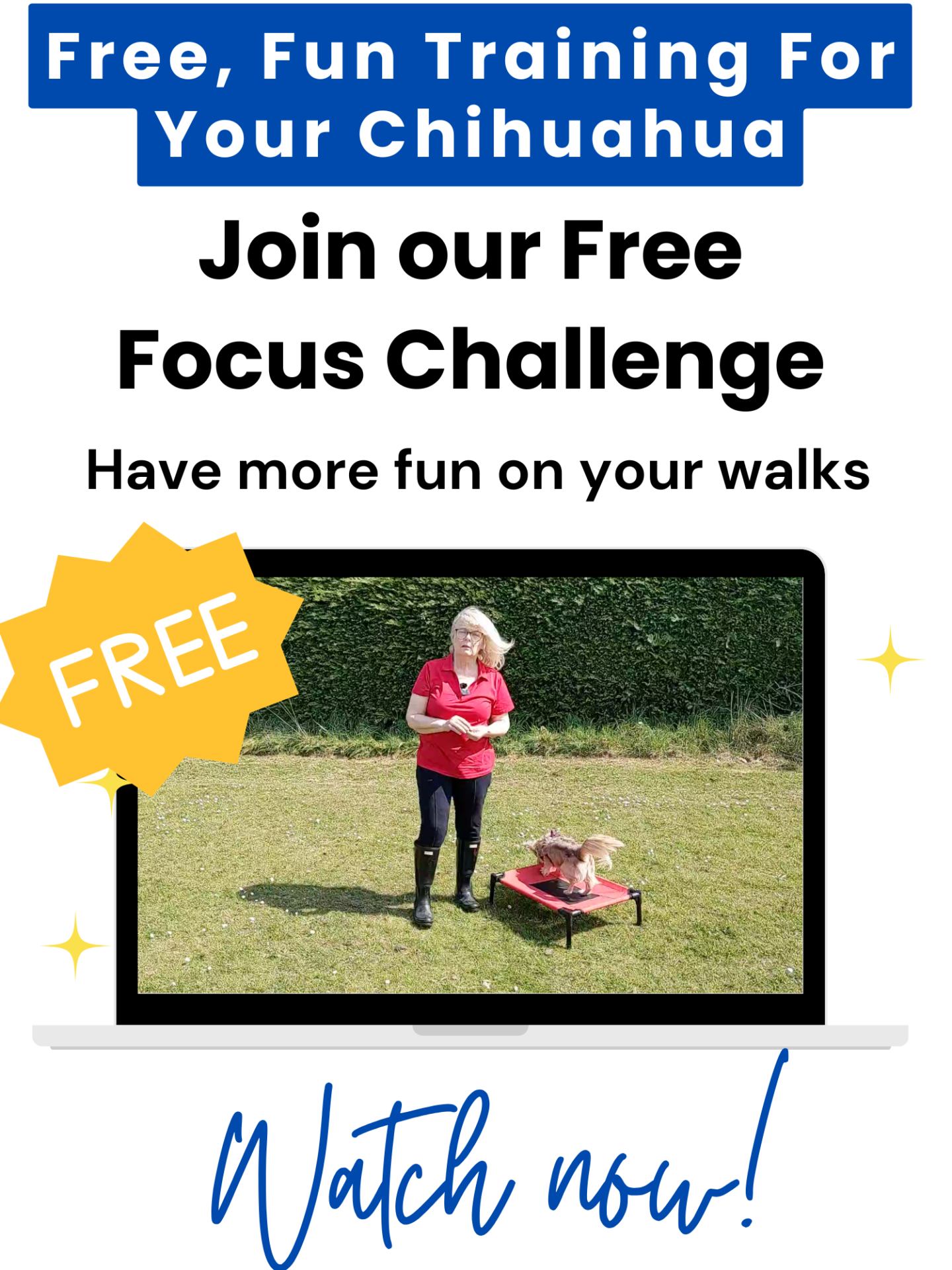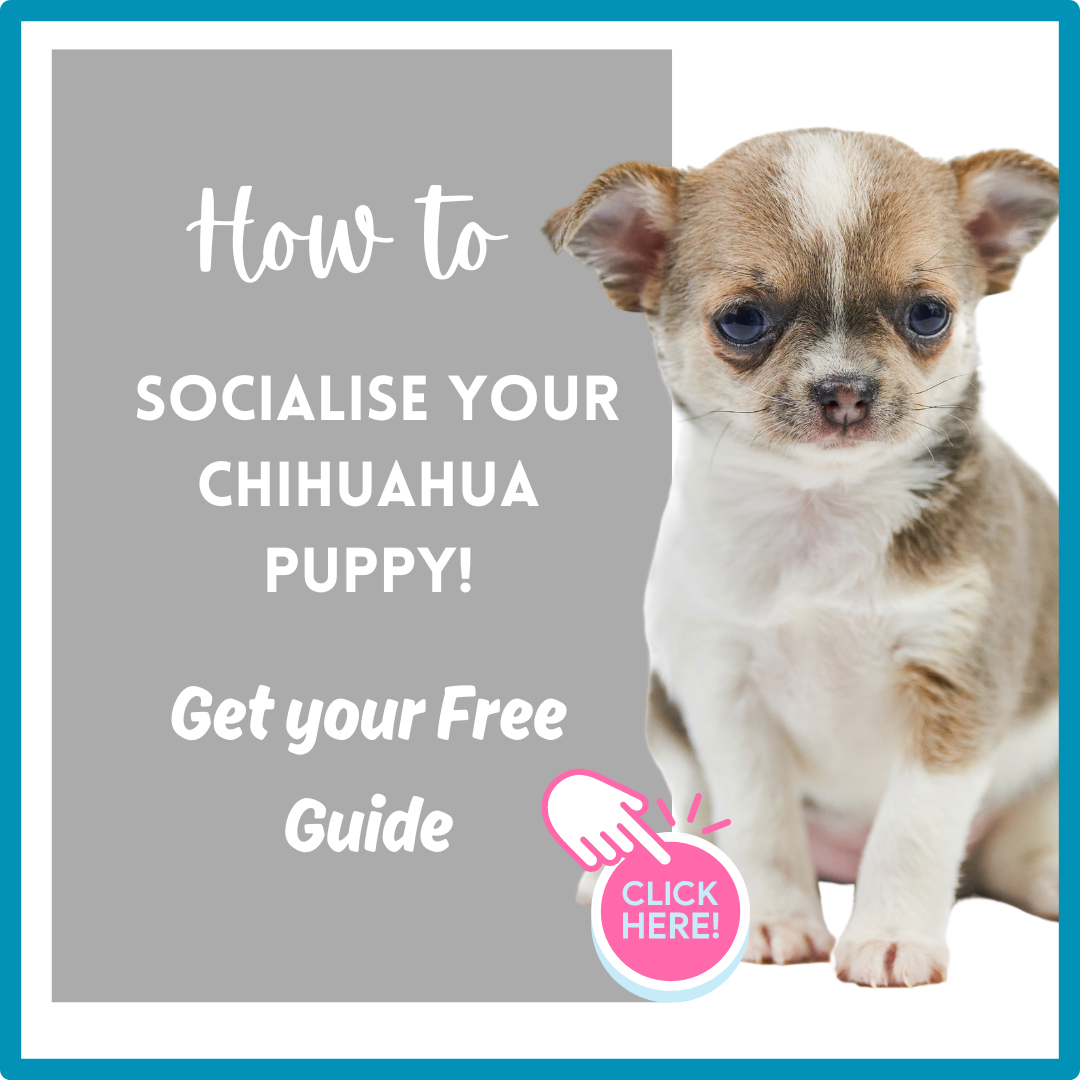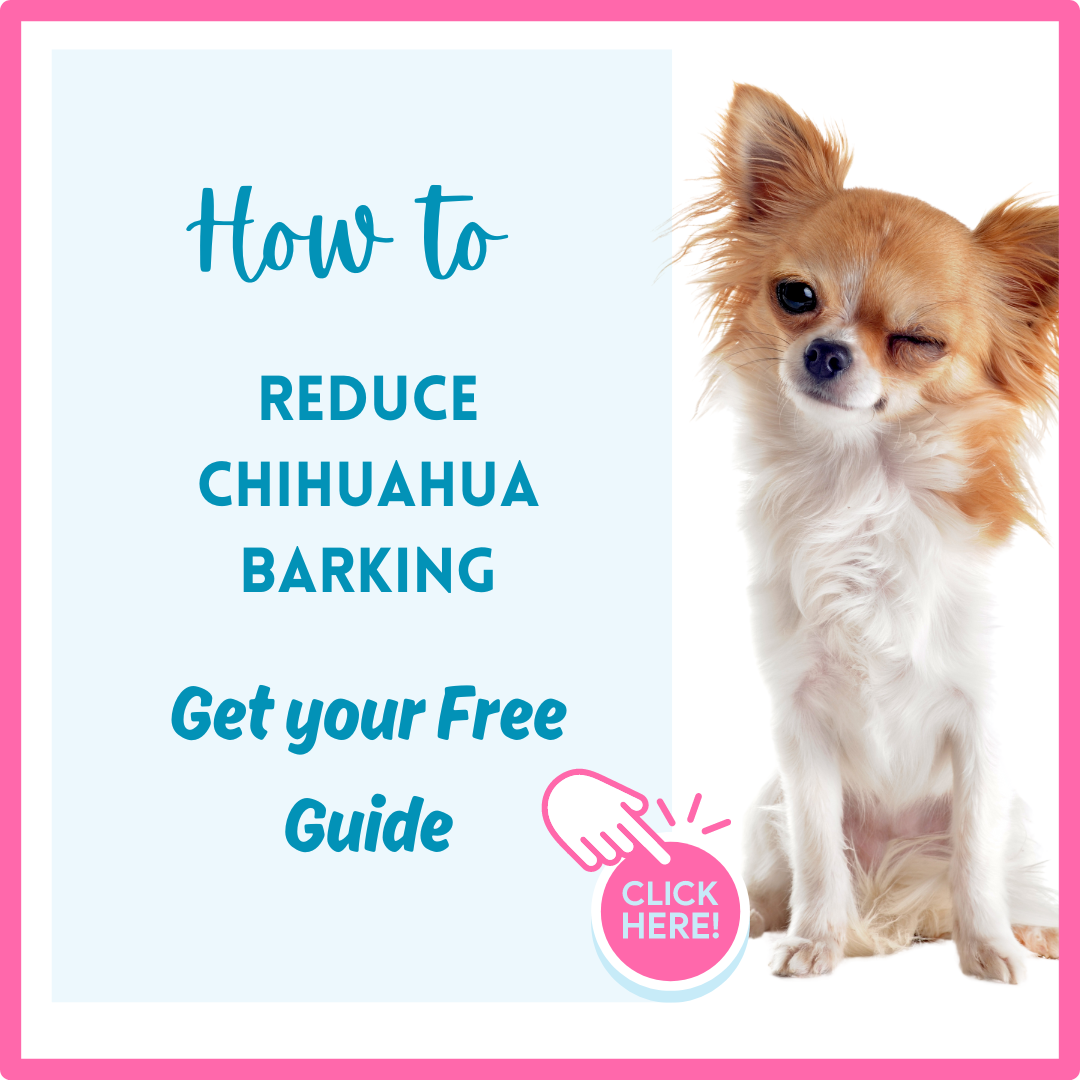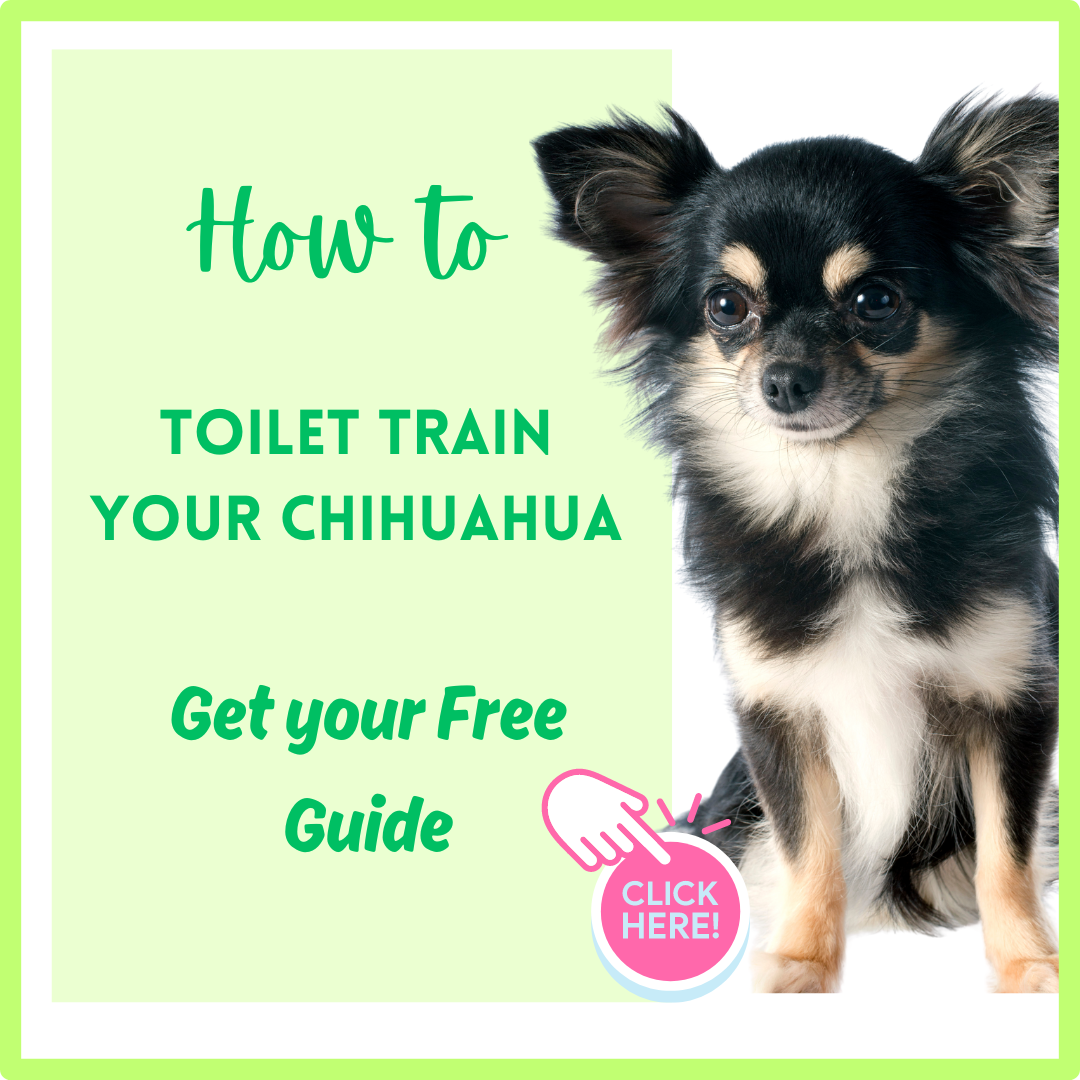Your chihuahua puppy is an open book
Their brain is a mass of flexible pathways and with the right management and training it’s easy to help them become bright, cheerful and an optimistic dogs. If we get it wrong then we can create the exact opposite, a dog that barks, bites and has a pessimistic outlook. Turning a pessimistic, over cautious dog around can be hard work.
Some of the personality has already been shaped by the breeder, so it’s extremely important to buy your chihuahua puppy from an experienced, reputable breeder. A puppy born to a stressed mother is more likely to have behaviour problems. This is one of many reason you need to make certain you are not buying from a puppy farm. Puppy farm dogs live in the worst situations and suffer dreadful cruelty. Please be super cautious.
A good breeder is likely to have done some of the work already by playing low level household cd’s and getting the puppy used to being handled. Don’t be scared to question the breeder.
#1: Socialise (not)
Ok so this is a departure from everything (including me) used to be told. We used to be told that our puppies should meet as many people and dogs as possible before they are sixteen weeks old, sixteen weeks being the theoretical ‘fear window’ cut off point. We were advised that we had to cram in as many experiences as possible before this magical date. However new thinking and research suggests that the ‘fear window’ idea is nonsense and pushing your puppy through a schedule of socialisation can cause harm rather than good.
Your puppy does need to meet new people and other dogs, but they need to be very positive, gentle and controlled interactions. Tom Mitchell (Behavavet) teaches that one negative experience can out weigh a hundred positive ones. I believe this is the error we made with Prince. We diligently took him to puppy socialisation, he barked at everything and became very stressed. Now he’s a nightmare around other dogs and it’s taking a huge amount of work to undo the damage. So only introduce your puppy to a very gentle, calm older dog when you think he’s ready. Build on it gently and slowly. If your chihuahua is stressed and unhappy don’t do it.
Introduce the great outdoors in tiny steps. there is a more detailed guide here. If its done two quickly you can overwhelm your chihuahua and create hard to fix flashbulb memories that will cause longterm behaviour issues.
Download you free guide to puppy socialisation here.
#2: Clean their teeth.
Get them used to teeth cleaning from the off. Chihuahuas have big issues with their teeth. Bad oral hygiene can cause major health issues as they get older. The bacteria in their mouth can cause heart disease, strokes and contribute to cancer. Keep teeth clean and get into a good, regular teeth cleaning routine.
#3 Baths and grooming your chihuahua puppy
Get used to being handled at the groomers and being bathed, brushed and having their nails clipped. If you are going to a groomers then go to one that’s calm and quiet. Maybe ask for an appointment when they are closed to start with. If you take your chi into a loud scary environment with lots of big dogs you could ruin the experience for ever.
#4: Household noise
Introduce household noises, like the vacuum cleaner and hair dryer so they are not stressed out by everyday activities. You can do this from a low level CD or start from another room so you don’t scare them. Playing background sounds of thunderstorms as a pup has been shown to reduce issues of noise phobias later on in life.
#5: Bedtime
Decide where your chi is going to sleep and stick to it. Many people allow their dogs to sleep on the bed, there is nothing wrong with this if it makes you all happy, but it can be a nuisance if your dog’s a fidget, you go on holiday, your chi must be boarded or stay in hospital..
A good compromise is having them sleeping in a basket on the bedroom floor or a crate as a den. A crate as a cosy den gives your chihuahua a place of his own and somewhere to go when things get too hectic. Read the Crate Debate
#6: Barking
Barking is a thing with chihuahuas and if you live somewhere that noise is an issue then think long and hard about whether a chihuahua is the right dog for you. Even a calm chihuahua will bark more than average.
But, it is possible to teach them what to bark at. They are very excitable dogs that become over aroused very quickly. This puts them on high alert and they start to treat every sound as a threat. They bark to get the threat to stay away. This is called avoidance. It’s unhelpful for your dog to rehearse this. You can download a guide on reducing chihuahua barking here.
Constant barking is very annoying and people reach for quick fix solution like electronic gadgets, squirting the dog with water, rattling tins filled with coins or anything that scares your dog into silence. All you will end up with is a sad dog who is afraid to speak and not longer trusts you. It may work in the moment, but you will pay for it in confidence based behaviour issues down the line. Barking is one of the main behaviour problems with chihuahuas and one of the main reasons they are surrendered.
#7: Get them used to you leaving
Chihuahuas are prone to imprinting on one person in the family and then making them their favourite. When that person goes out they can become stressed. Get your chihuahua used to your coming and going so this does not become an issue. It’s very hard to undo later. Go in and out regularly without making a big thing about it. Don’t over pet them before you go or make a massive fuss when you get back in. If you are not stressed your chihuahua puppy will take his cue from you. If you do have separation anxiety issues read: How to deal with separation anxiety
#8: Don’t ignore basic training
Many owners think, as their chihuahua is small, they don’t need to be trained. This is not true. A badly-behaved dog is a pain in the butt. Chihuahuas don’t always do well at training school unless it’s for small dogs and even then they may bark with stress. Once they are barking and over aroused they can’t learn anything. Consider games based learning which is the type of training we teach at Chihuahua School. You can find out more about chihuahua training in our online training school Chihuahua School here.
#9 Get them used to a crate or a pen
Get them used to a crate. Now, once upon a time I was dead against crates and would never advocate using one. But since becoming a dog trainer and having my own litter of puppies I have had a re-think. A puppy needs plenty of rest. It’s called active rest, this means putting them down for a nap somewhere where they don’t get to zoom about when they hear a noise. You are taking the decisions away from them so they can have an uninterrupted sleep. If your puppy doesn’t get a good sleep in the day you will end up with an overstimulated, bitey, barky dog.
What a crate isn’t, is a place to leave your dog for hours on end while you go to work nor is it a solution for toilet training. Obviously with COVID many people are working from home, (this will have it’s own repercussions later on). A crate is a den, a safe comfy cosy place your chi feels safe to snooze. It should be a family rule that when puppy is sleeping he is left alone.
Hard work but worth the effort
Having a puppy is hard work, having a chihuahua puppy is even harder. They are wilful, extremely naughty and very destructive. They are also super cute, smell divine and will love you forever. Putting the work in now will ensure you don’t end up with a chi-zilla.
So many chihuahuas are surrendered because of appalling behaviour. 99.9% of these cases is because the dog has been poorly socialised, spoilt and babied. They are not accessories to go in a handbag, to be carried around or dressed up like a doll.
Chihuahuas are dogs not toys, they must be treated like a dog and will respect you as their guardian for setting the correct boundaries and taking care of their needs.
Find our more about Chihuahua School here
Discover more from Chihuahua School by Chihuahua Power
Subscribe to get the latest posts sent to your email.










My chihuahua girl was well socialised with people and it helped that I have an immensely sociable terrier.
Then just before she was a year old and her second season prevailed, she took to going for people! No provocation was ever on display. She just seemed to suddenly dislike the human race. Fine with me and the family and close friends that she knew. But strangers were a major no no. She has been spayed now and has calmed down considerably but still dislike people to close to her especially their faces.